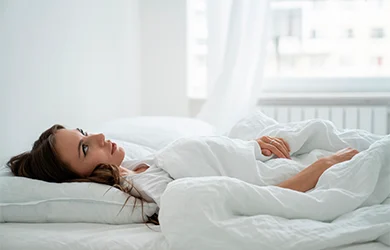5 Times You Might Have Trouble Falling Asleep & What to Do About It
Ever wonder why coming back from a relaxing vacation somehow feels so exhausting? It’s because you likely broke out of your regular sleep routine—you stayed awake late into the night, enjoyed sleeping in through the early morning hours.


Ever wonder why coming back from a relaxing vacation somehow feels so exhausting? It’s because you likely broke out of your regular sleep routine—you stayed awake late into the night, enjoyed sleeping in through the early morning hours. Now that it’s back to your regular day-to-day, your body is having trouble falling asleep. The same may also be true of some holidays and time changes. Keep reading to find out when those times are.
1. Post-New Year Slump
The days leading up to New Year’s Eve, no one even knows what day of the week it is. Kids are off school, enjoying endless free time. Family movie nights last way past bedtime. By the time the new year rolls around and it’s time to head back to school and regular routines, our bodies want to stay up past midnight and sleep through the early morning hours. It’s ok to have trouble falling asleep as you go back into your routine—the key is slowly getting your sleep hygiene back on track.
2. Spring Forward to Daylight Saving Time
The second Sunday in March marks the first day of Daylight Saving Time. At 2:00 AM, we move our clocks up an hour to 3:00 AM. Yes, that means you “lose” an hour of sleep that night. Because the time springs forward an hour, but your sleep-wake times are expected to stay the same, you may struggle to fall asleep or feel groggy in the morning the first few days after the time change.
3. Back to School
All summer breaks must come to an end. Whether your kids spent the summer in camp, lounging at home, or in summer school, a new school year means new teachers, classmates, expectations, and more. It’s a lot to think about, for both parents and kids. Ease your family into the new school year by bringing back all the best sleep tips and tricks—like getting off technology an hour before bed and slowly making bedtime earlier.
4. Fall Back to Standard Time
On the first Sunday in November, the clocks fall back an hour back to Standard Time, giving us more sleep. The extra hour might feel nice at first, until the sun starts setting before you leave the office to head home, and temperatures start to drop as winter settles in. Stick to your good sleep habits – even though the sky is darker earlier, the blue light coming from smartphones and TVs can still block your brain from sending out the signal that it’s time to go to sleep.
5. The Night Before a Big Event
Months of preparation can all come tumbling down if you can’t sleep a wink the night before a big event. Or worse, you have trouble waking up the next day, if you hear your alarm at all. Whether it’s the night before your dream job interview, SAT exam, or wedding, make sure you set yourself up for a good night’s sleep. That means no napping during the day or drinking caffeine at night.
Good sleep hygiene is important 365 days of the year, at every age. As you mark up your calendar, take note of what special days, events, and time changes are coming up, so you can adjust your sleep schedule to make sure you and the whole family are getting enough sleep to keep you well rested and healthy.
Good sleep hygiene is important 365 days of the year, at every age. As you mark up your calendar, take note of what special days, events, and time changes are coming up, so you can adjust your sleep schedule to make sure you and the whole family are getting enough sleep to keep you well rested and healthy.


![[en-ca]What is the Circadian Rhythm & 3 Tips to Keep it In Check](http://images.ctfassets.net/klfgau6xxt2r/4ABFceE7Gz97oJECjlw5Ro/5ab48584e85a1b36b65245da6329efcc/Desktop_Banner_0008_shutterstock_272684912.jpg)
![[en-ca] How to fall asleep fast](http://images.ctfassets.net/klfgau6xxt2r/4lQ0Axt6HpKU55ix5stRWe/99091f5c06089463be676b0b83e449c6/Desktop_Banner_0029_shutterstock_1299304069.jpg)
![[en-ca] What is Melatonin? | ZzzQuil](http://images.ctfassets.net/klfgau6xxt2r/4DYuy8QxYvO6ZOWAZrVWKi/2681c98338d4f53dced83867808796e7/Desktop_Banner_0022_shutterstock_1536338213.jpg)